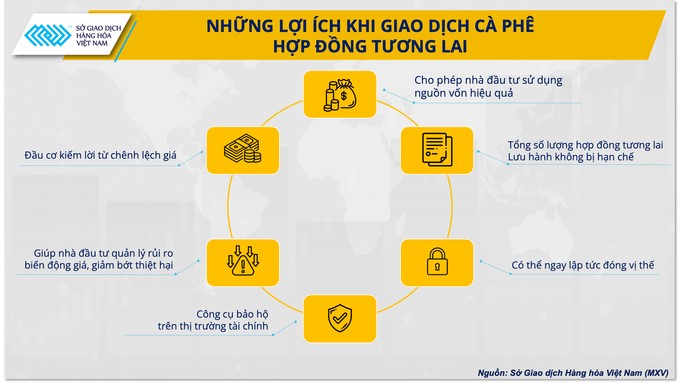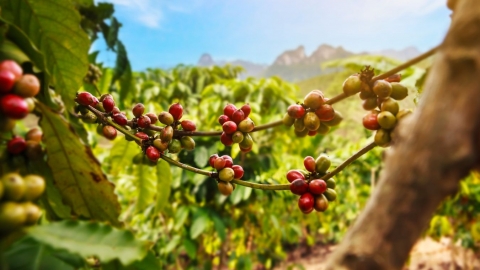(VAN) Experts from the Mercantile Exchange of Vietnam offered an effective risk prevention tool against current fluctuations in coffee prices.
Coffee prices can easily form a sharp decline
World and domestic coffee prices in November recorded a historic wave of increases. According to records from the Mercantile Exchange of Vietnam (MXV), the price of Robusta coffee on the Intercontinental Exchange-Europe (ICE-EU) has broken the old historical peak, even exceeding the mark of USD 5,700/ton at one point. By the end of the trading session on November 30, Robusta coffee prices were double the same period in 2023 and increased by about 30% compared to the beginning of the month.
Domestically, the price of green coffee in the Central Highlands and Southern provinces as of November 30 was at VND 130,000/kg, more than 2 times higher than the same period last year and increasingly close to the old historical peak in April, when it stopped at VND 134,400/kg.

Mr. Nguyen Ngoc Quynh, Deputy General Director of MXV, said that after a strong increase due to speculative factors, coffee prices can easily form a sharp decline to bring the price back to the correct price level determined by the supply-demand principle.
According to MXV, in addition to concerns about persistent source shortages from early 2024, speculation, a typical factor of the coffee derivatives market, is an important reason driving coffee prices to continuously increase strongly in the past month.
Since Donald Trump won the 2024 US Presidential Election race, the market has seen a shift in cash flow from haven channels such as gold and precious metals to highly profitable investment channels such as coffee and cocoa. Combined with concerns about supply shortages, the market has increased expectations that coffee prices will continue to increase, pushing speculators to increase their holding of buying positions.
Regarding supply-demand information, since October, rain has returned to Brazil’s main coffee-growing region, but the rainfall has continuously been below the historical average. Combined with many previous record dry months, the market increasingly believes that this country’s coffee output in the 2024-2025 and 2025-2026 crop years will be low. The Brazilian Government’s National Supply Company (CONAB) has lowered its 2024-2025 output forecast to 54.8 million bags, down 7% over the previous forecast and about 300,000 bags lower than the previous crop. At the same time, StoneX Consulting Firm predicts that coffee output in the 2025-2026 crop year will decrease by 0.4% compared to the 2024-2025 crop, to 65.6 million 60-kg bags.
In Vietnam, November is usually the time when new-crop coffee begins to be supplied to the market and export volume gradually increases. But this year, farmers are not in a hurry to sell, causing exports of the new crop to remain bleak. According to the General Department of Vietnam Customs, in the first half of November, Vietnam exported only 20,933 tons of coffee, a sharp decrease of 45% compared to the same period in 2023, even 3% lower than the first 15 days of October.
Commenting on movements in the coffee market based on historical lessons, Mr. Nguyen Ngoc Quynh, Deputy General Director of MXV, said that after a strong increase due to speculative factors, coffee prices can easily form a sharp decline to bring the price back to the correct price level determined by the supply-demand principle. In particular, Vietnam is in the process of pushing the supply of new-crop coffee to the market, so prices are more likely to plummet than world prices.
Hedging prices through futures contracts is essential
Faced with unprecedented strong fluctuations in the coffee market over the past year, Mr. Quynh shared that coffee is a commodity that is very sensitive to supply-demand information as well as macroeconomic factors, so hedging prices through the coffee derivatives market, specifically futures contracts, is essential. In particular, Vietnam is now the second largest coffee-producing country in the world, and in the last months of the year, when the harvest is in the main season and export activities are promoted, price movements fluctuate strongly and tend to reverse.
In theory, price hedging through coffee futures contracts is an important tool to help protect businesses from unexpected price fluctuations, especially when prices are likely to decline sharply in the future.
A futures contract is an agreement between two parties: buyer and seller. In which the buyer commits to buy a quantity of coffee at a certain price at a certain time in the future, and the seller commits to sell coffee at that price. Using coffee futures contracts helps businesses ensure stable prices for their products, thereby minimizing risks due to price fluctuations.

Hedging prices through coffee futures contracts is a useful tool to help businesses protect themselves from large price fluctuations, especially when prices can plummet.
For example, if a Vietnamese coffee export business is concerned that coffee prices will drop sharply next month, they can sign a futures contract to sell coffee at a fixed price. This helps businesses protect profits even if coffee prices on the market decrease.
In addition, using coffee futures contracts is also a way to ensure a source of goods for real traders in case of outages during real transactions. In fact, when prices fluctuate too quickly and strongly, the possibility of “breaking” the contract and the benefit competition is very likely to happen. At this time, conducting coffee transactions through the derivatives market in the form of physical delivery and receipt can help parties ensure coffee sources for commercial activities.
However, to achieve maximum efficiency, businesses still need to have a clear strategy and a deep understanding of the market and factors affecting coffee prices.
Agriculture News | Agri Products Price



